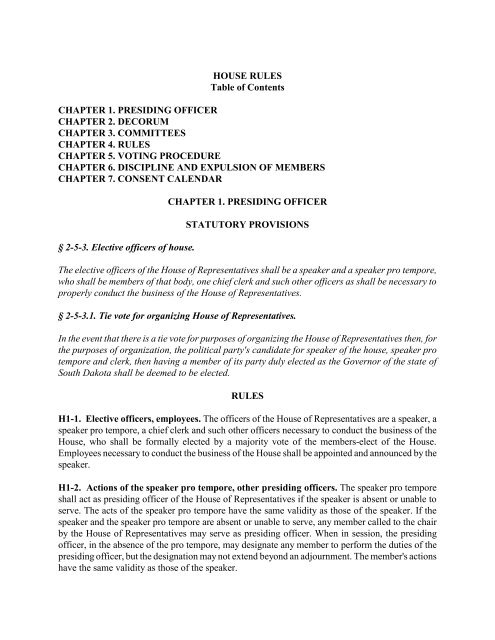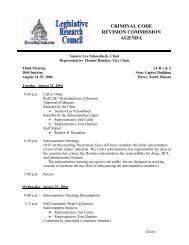HOUSE RULES Table of Contents CHAPTER 1. PRESIDING ...
HOUSE RULES Table of Contents CHAPTER 1. PRESIDING ...
HOUSE RULES Table of Contents CHAPTER 1. PRESIDING ...
You also want an ePaper? Increase the reach of your titles
YUMPU automatically turns print PDFs into web optimized ePapers that Google loves.
<strong>HOUSE</strong> <strong>RULES</strong><br />
<strong>Table</strong> <strong>of</strong> <strong>Contents</strong><br />
<strong>CHAPTER</strong> <strong>1.</strong> <strong>PRESIDING</strong> OFFICER<br />
<strong>CHAPTER</strong> 2. DECORUM<br />
<strong>CHAPTER</strong> 3. COMMITTEES<br />
<strong>CHAPTER</strong> 4. <strong>RULES</strong><br />
<strong>CHAPTER</strong> 5. VOTING PROCEDURE<br />
<strong>CHAPTER</strong> 6. DISCIPLINE AND EXPULSION OF MEMBERS<br />
<strong>CHAPTER</strong> 7. CONSENT CALENDAR<br />
§ 2-5-3. Elective <strong>of</strong>ficers <strong>of</strong> house.<br />
<strong>CHAPTER</strong> <strong>1.</strong> <strong>PRESIDING</strong> OFFICER<br />
STATUTORY PROVISIONS<br />
The elective <strong>of</strong>ficers <strong>of</strong> the House <strong>of</strong> Representatives shall be a speaker and a speaker pro tempore,<br />
who shall be members <strong>of</strong> that body, one chief clerk and such other <strong>of</strong>ficers as shall be necessary to<br />
properly conduct the business <strong>of</strong> the House <strong>of</strong> Representatives.<br />
§ 2-5-3.<strong>1.</strong> Tie vote for organizing House <strong>of</strong> Representatives.<br />
In the event that there is a tie vote for purposes <strong>of</strong> organizing the House <strong>of</strong> Representatives then, for<br />
the purposes <strong>of</strong> organization, the political party's candidate for speaker <strong>of</strong> the house, speaker pro<br />
tempore and clerk, then having a member <strong>of</strong> its party duly elected as the Governor <strong>of</strong> the state <strong>of</strong><br />
South Dakota shall be deemed to be elected.<br />
<strong>RULES</strong><br />
H1-<strong>1.</strong> Elective <strong>of</strong>ficers, employees. The <strong>of</strong>ficers <strong>of</strong> the House <strong>of</strong> Representatives are a speaker, a<br />
speaker pro tempore, a chief clerk and such other <strong>of</strong>ficers necessary to conduct the business <strong>of</strong> the<br />
House, who shall be formally elected by a majority vote <strong>of</strong> the members-elect <strong>of</strong> the House.<br />
Employees necessary to conduct the business <strong>of</strong> the House shall be appointed and announced by the<br />
speaker.<br />
H1-2. Actions <strong>of</strong> the speaker pro tempore, other presiding <strong>of</strong>ficers. The speaker pro tempore<br />
shall act as presiding <strong>of</strong>ficer <strong>of</strong> the House <strong>of</strong> Representatives if the speaker is absent or unable to<br />
serve. The acts <strong>of</strong> the speaker pro tempore have the same validity as those <strong>of</strong> the speaker. If the<br />
speaker and the speaker pro tempore are absent or unable to serve, any member called to the chair<br />
by the House <strong>of</strong> Representatives may serve as presiding <strong>of</strong>ficer. When in session, the presiding<br />
<strong>of</strong>ficer, in the absence <strong>of</strong> the pro tempore, may designate any member to perform the duties <strong>of</strong> the<br />
presiding <strong>of</strong>ficer, but the designation may not extend beyond an adjournment. The member's actions<br />
have the same validity as those <strong>of</strong> the speaker.
H1-3. Votes by the speaker. The speaker shall vote on all questions taken by yeas and nays and<br />
shall vote in any election or division called for by any member. The speaker may, by relinquishing<br />
the chair, assume all rights and privileges <strong>of</strong> a member <strong>of</strong> the House.<br />
H1-4. Hour <strong>of</strong> meeting. The hour <strong>of</strong> meeting <strong>of</strong> the House <strong>of</strong> Representatives is 2:00 p.m. on each<br />
legislative day unless otherwise ordered by the House.<br />
H1-5. Seating assignments. The speaker <strong>of</strong> the House shall, with the advice <strong>of</strong> the majority and<br />
minority leaders, make seating assignments for the floor <strong>of</strong> the House <strong>of</strong> Representatives.<br />
H2-<strong>1.</strong> Repealed.<br />
H2-2. Repealed.<br />
H2-3. Repealed.<br />
<strong>CHAPTER</strong> 2. DECORUM<br />
<strong>CHAPTER</strong> 3. COMMITTEES<br />
H3-<strong>1.</strong> Appointment <strong>of</strong> standing committees. The speaker <strong>of</strong> the House <strong>of</strong> Representatives shall,<br />
with advice from the minority leader, appoint the members <strong>of</strong> the following standing committees<br />
with the number <strong>of</strong> members as indicated after each committee and shall appoint the chair and vice<br />
chair <strong>of</strong> each committee:<br />
<strong>1.</strong> Agriculture and Natural Resources (13)<br />
2. Appropriations (9)<br />
3. Commerce and Energy (13)<br />
4. Education (15)<br />
5. Government Operations and Audit (5)<br />
6. Health and Human Services (13)<br />
7. Judiciary (13)<br />
8. Legislative Procedure (7)<br />
9. Local Government (13)<br />
10. Retirement Laws (5)<br />
1<strong>1.</strong> State Affairs (13)<br />
12. Taxation (15)<br />
13. Transportation (13)<br />
In the absence <strong>of</strong> the committee chair, the vice chair shall act as chair. The speaker and speaker pro<br />
tempore are members <strong>of</strong> the legislative procedure committee, and the speaker shall serve as chair <strong>of</strong><br />
the legislative procedure committee.<br />
<strong>CHAPTER</strong> 4. <strong>RULES</strong>
H4-<strong>1.</strong> Adoption, suspension, or amendment <strong>of</strong> House rules. A motion to adopt rules <strong>of</strong> the<br />
House <strong>of</strong> Representatives shall be decided by a majority <strong>of</strong> the members-elect and is subject to<br />
debate. A motion to suspend or amend a rule <strong>of</strong> the House <strong>of</strong> Representatives shall be decided by<br />
a two-thirds majority <strong>of</strong> the members-elect and is subject to debate.<br />
H4-2. Proceedings governed by Mason's Manual. Mason's Manual <strong>of</strong> Legislative Procedure<br />
governs the proceedings <strong>of</strong> the House <strong>of</strong> Representatives in all cases not covered by these rules or<br />
the Joint Rules.<br />
H4-3. Conflicting rules. If the rules <strong>of</strong> the House <strong>of</strong> Representatives and the Joint Rules conflict,<br />
the rules <strong>of</strong> the House <strong>of</strong> Representatives govern.<br />
<strong>CHAPTER</strong> 5. VOTING PROCEDURE<br />
H5-<strong>1.</strong> Electronic voting system. The electronic voting system is under the control <strong>of</strong> the presiding<br />
<strong>of</strong>ficer and shall be operated at the presiding <strong>of</strong>ficer's direction by the chief clerk or the chief clerk's<br />
designee. The names <strong>of</strong> the members shall be listed on the electronic roll call board in alphabetical<br />
order, except the name <strong>of</strong> the speaker <strong>of</strong> the House, which shall be last.<br />
H5-2. Votes to be taken on the electronic system. On any question requiring the "yeas" and "nays"<br />
to be entered upon the journal, the electronic voting system shall be used. On any such question,<br />
neither individual votes nor vote totals may be displayed to any person including the presiding<br />
<strong>of</strong>ficer until the time for voting has expired and the voting system has been locked. If the electronic<br />
voting system is not in operating order at the time to vote on any such question, the presiding <strong>of</strong>ficer<br />
shall order that all "yea" and "nay" votes be taken by calling the roll in alphabetical order, except the<br />
name <strong>of</strong> the speaker <strong>of</strong> the House, which shall be last.<br />
H5-3. Other votes. On all other questions to be voted upon, except upon elections, the presiding<br />
<strong>of</strong>ficer may order the "yeas" and "nays" to be taken by the electronic voting system, voice vote, or<br />
standing vote. Upon demand <strong>of</strong> a member requesting a division before the result <strong>of</strong> a vote has been<br />
announced by the presiding <strong>of</strong>ficer, the "yeas" and "nays" shall be taken by the electronic voting<br />
system.<br />
H5-4. Electronic voting system malfunctions. The vote <strong>of</strong> any member which has not been<br />
recorded because <strong>of</strong> malfunction <strong>of</strong> the electronic voting system shall be entered upon the journal,<br />
if the member was in the House chamber at the time <strong>of</strong> the vote and voted at the appropriate time,<br />
and the malfunction is reported to the presiding <strong>of</strong>ficer before the presiding <strong>of</strong>ficer's announcement<br />
<strong>of</strong> the result <strong>of</strong> the vote.<br />
H5-5. Voting procedures. When the House is ready to vote upon any question using the electronic<br />
voting system, the presiding <strong>of</strong>ficer shall state: "The question is . . . (designating the matter to be<br />
voted upon). All in favor <strong>of</strong> such question shall vote 'yea', all opposed shall vote 'nay'." The presiding<br />
<strong>of</strong>ficer shall then direct the chief clerk to unlock the voting system and announce, "The House will<br />
now proceed to vote."
When, in the judgment <strong>of</strong> the presiding <strong>of</strong>ficer, reasonable time has been allowed all members<br />
present in the House to vote, the presiding <strong>of</strong>ficer shall ask the question: "Have all members present<br />
voted?" After a pause, the presiding <strong>of</strong>ficer shall direct the chief clerk to record those members who<br />
are "Absent" or "Excused" and to lock the voting system after late votes, if any, are recorded, and<br />
to display and record the individual and total votes. The presiding <strong>of</strong>ficer shall then announce the<br />
vote. The chief clerk shall enter upon the journal the result in the manner provided by the joint rules<br />
<strong>of</strong> the Legislature.<br />
H5-6. Changing votes. Any member may change a vote after the vote recording equipment has<br />
started to operate if the member rises and, when recognized by the presiding <strong>of</strong>ficer, announces the<br />
change before the result <strong>of</strong> the vote has been announced by the presiding <strong>of</strong>ficer.<br />
H5-7. Voting records. On any question requiring the "yeas" and "nays" to be entered upon the<br />
journal, the chief clerk shall retain one copy <strong>of</strong> the recorded vote on the electronic voting system and<br />
provide it for purposes <strong>of</strong> the daily journal.<br />
H5-8. Members to vote electronically from their desks, exceptions. A member may vote on the<br />
electronic voting system only when at the member's desk. However, the presiding <strong>of</strong>ficer may<br />
authorize the chief clerk to call the names <strong>of</strong> members who are on the floor but not at their desks at<br />
the time <strong>of</strong> a vote and to record the votes <strong>of</strong> such members on the electronic voting system. If a<br />
member other than the speaker <strong>of</strong> the House is presiding, the chief clerk shall switch the voting<br />
system to allow the designated member presiding to vote in the presiding <strong>of</strong>ficer's station.<br />
H5-9. Voting by proxy prohibited. No member may vote for another member; nor may any other<br />
person cast a vote for a member, except as otherwise provided in these rules. Any member who votes<br />
or attempts to vote for another member, or a person not a member who votes or attempts to vote for<br />
a member, is in contempt <strong>of</strong> the House and may be punished pursuant to law.<br />
H5-10. Tampering with electronic voting equipment prohibited. Any member or other person<br />
who willfully tampers with or attempts to disarrange, deface, impair or destroy in any manner<br />
whatsoever the electronic voting equipment used by the House <strong>of</strong> Representatives, or who instigates,<br />
aids or abets with the intent to destroy or change the record <strong>of</strong> votes thereon, is in contempt <strong>of</strong> the<br />
House and may be punished pursuant to law.<br />
H5-1<strong>1.</strong> Voting machine for session use only. The electronic voting equipment may only be used<br />
when the House <strong>of</strong> Representatives is in session.<br />
<strong>CHAPTER</strong> 6. DISCIPLINE AND EXPULSION OF MEMBERS<br />
H6-<strong>1.</strong> Select Committee on Discipline and Expulsion. Any two representatives may by written<br />
motion first delivered to the Speaker move for the establishment <strong>of</strong> a Select Committee on Discipline<br />
and Expulsion to investigate the conduct <strong>of</strong> any other representative. Upon being seconded, the<br />
motion is debatable, and passage <strong>of</strong> the motion requires a majority vote <strong>of</strong> the members-elect. The<br />
Select Committee on Discipline and Expulsion shall be composed <strong>of</strong> nine members <strong>of</strong> the House <strong>of</strong><br />
Representatives. The chair and vice chair <strong>of</strong> the select committee shall be chosen by the Speaker <strong>of</strong>
the House and may not both be members <strong>of</strong> the same political party. The other seven members <strong>of</strong><br />
the select committee shall be chosen by the Speaker <strong>of</strong> the House in consultation with the majority<br />
leader and the minority leader. No more than five members may be <strong>of</strong> the same political party.<br />
H6-2. Meetings; notice; quorum; vote. All meetings <strong>of</strong> the Select Committee on Discipline and<br />
Expulsion shall be held in the Capitol. A majority <strong>of</strong> the members <strong>of</strong> the committee constitutes a<br />
quorum. The affirmative vote <strong>of</strong> a majority <strong>of</strong> those present and voting, assuming a quorum, is<br />
required for actions <strong>of</strong> the committee.<br />
All meetings <strong>of</strong> the Select Committee on Discipline and Expulsion are open meetings in like manner<br />
to any other House <strong>of</strong> Representatives committee meeting. All meetings shall be webcast and<br />
archived in like manner to any other House <strong>of</strong> Representatives committee meeting.<br />
All meetings <strong>of</strong> the Select Committee on Discipline and Expulsion shall be scheduled at times that<br />
are not in conflict with any other <strong>of</strong>ficial House <strong>of</strong> Representatives business. All members <strong>of</strong> the<br />
House <strong>of</strong> Representatives have the right to be present during all <strong>of</strong> the select committee's meetings.<br />
H6-3. Oath. Prior to consideration <strong>of</strong> any matter referred to it, except establishing a quorum, the<br />
members <strong>of</strong> the select committee shall subscribe to the following oath, which shall be administered<br />
by the Chief Clerk <strong>of</strong> the House <strong>of</strong> Representatives:<br />
"I do solemnly swear (affirm) that in all things appertaining to the matter referred to this select<br />
committee, I will do impartial justice according to the Constitution, laws, Joint Rules, and House<br />
Rules <strong>of</strong> the State <strong>of</strong> South Dakota. I do solemnly swear that I will faithfully and impartially<br />
discharge and perform all the duties incumbent upon me as a member <strong>of</strong> the House Select<br />
Committee on Discipline and Expulsion in the aforesaid matter, according to the best <strong>of</strong> my ability<br />
and understanding, so help me God."<br />
H6-4. Procedure in committee.<br />
The Select Committee on Discipline and Expulsion shall:<br />
(1) Conduct all hearings in like manner to any other House <strong>of</strong> Representatives committee<br />
meeting, and only after informing the member who is the subject <strong>of</strong> the hearing in writing <strong>of</strong><br />
the date and time <strong>of</strong> each meeting held for the purpose;<br />
(2) Invite the member who is the subject <strong>of</strong> the hearing to attend all meetings <strong>of</strong> the committee<br />
in person and to be accompanied by legal counsel, or to be represented at the hearings by legal<br />
counsel <strong>of</strong> the member's choice and at the member's own expense;<br />
(3) Afford the member full opportunity to present the member's position, to present witnesses<br />
in support <strong>of</strong> the member's position, and extend the opportunity to confront and to question<br />
witnesses called by the committee;
(4) Advise the member immediately <strong>of</strong> the date and time <strong>of</strong> each meeting, in cases where the<br />
committee adjourns prior to completing its work and submitting its report to the House <strong>of</strong><br />
Representatives.<br />
If the House <strong>of</strong> Representatives is called into special session for the express purpose <strong>of</strong> investigating<br />
the conduct <strong>of</strong> a Representative, the member is deemed to have received constructive notice within<br />
the provisions <strong>of</strong> this rule.<br />
H6-5. Subpoena power; punishment for contempt. The select committee is hereby specifically<br />
and expressly granted the power and authority, with the written approval <strong>of</strong> the chair <strong>of</strong> the<br />
committee, to hold hearings, subpoena witnesses, administer oaths, require the production <strong>of</strong> books<br />
and records, and to do all other things necessary to accomplish the purpose <strong>of</strong> its hearings and<br />
deliberations.<br />
If a subpoena is not honored, the select committee also has the power to punish for contempt and to<br />
provide for the prosecution <strong>of</strong> any person for refusal to testify, false swearing, or perjury before the<br />
select committee in accordance with law.<br />
H6-6. Receipt <strong>of</strong> resignation; authority <strong>of</strong> the chair. If, prior to resolution <strong>of</strong> the investigation, a<br />
written resignation signed by the representative who is the subject <strong>of</strong> the investigation has been<br />
received by the chair, the chair may terminate the meetings <strong>of</strong> the select committee.<br />
H6-7. Select committee report. Any action to expel, censure, discipline, or exonerate a<br />
representative shall be proposed in a select committee report <strong>of</strong> the Select Committee on Discipline<br />
and Expulsion. If the select committee report calls for expulsion, censure, or discipline, the report<br />
shall set forth the causes and grounds for which expulsion, censure, or discipline is being<br />
recommended by the House <strong>of</strong> Representatives, and it shall state the particular form <strong>of</strong> action<br />
recommended to the House <strong>of</strong> Representatives. If the select committee report calls for exoneration,<br />
the report shall set forth the reasons why exoneration is appropriate.<br />
H6-8. Procedure in the House <strong>of</strong> Representatives. Adoption <strong>of</strong> a select committee report for the<br />
expulsion <strong>of</strong> a representative requires the favorable vote <strong>of</strong> a two-thirds majority <strong>of</strong> the elected<br />
members. Adoption <strong>of</strong> a select committee report for the censure or discipline <strong>of</strong> a representative<br />
requires the favorable vote <strong>of</strong> a three-fifths majority <strong>of</strong> the elected members. Adoption <strong>of</strong> a select<br />
committee report for the exoneration <strong>of</strong> a representative requires the favorable vote <strong>of</strong> a majority <strong>of</strong><br />
the elected members.<br />
<strong>CHAPTER</strong> 7. CONSENT CALENDAR<br />
H 7-<strong>1.</strong> Consent calendar. Notwithstanding Joint Rule 13-1, a bill requiring a two-thirds vote <strong>of</strong> the<br />
members-elect may not be voted on the House consent calendar. If such a bill is placed on the House<br />
consent calendar, the presiding <strong>of</strong>ficer shall order it removed and placed on the next legislative day's<br />
regular bill calendar.
H7-2. Approval <strong>of</strong> consent calendar is final disposition. Notwithstanding Joint Rule 13-4, after<br />
allowing a reasonable time for questions from the floor on the bills and resolutions on the consent<br />
calendar and after permitting the proponents to answer the questions, the Speaker <strong>of</strong> the House shall<br />
call for a vote on the consent calendar. Approval <strong>of</strong> the consent calendar by a majority <strong>of</strong> the<br />
members-elect <strong>of</strong> the House is considered final disposition <strong>of</strong> all the bills and resolutions on the<br />
consent calendar.






